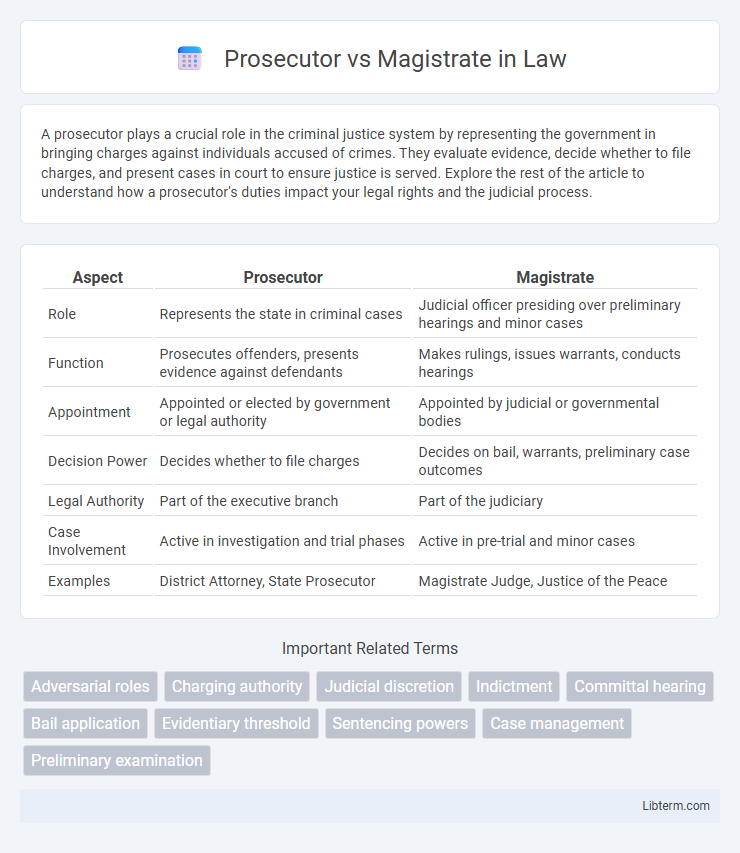A prosecutor plays a crucial role in the criminal justice system by representing the government in bringing charges against individuals accused of crimes. They evaluate evidence, decide whether to file charges, and present cases in court to ensure justice is served. Explore the rest of the article to understand how a prosecutor's duties impact your legal rights and the judicial process.
Table of Comparison
| Aspect | Prosecutor | Magistrate |
|---|---|---|
| Role | Represents the state in criminal cases | Judicial officer presiding over preliminary hearings and minor cases |
| Function | Prosecutes offenders, presents evidence against defendants | Makes rulings, issues warrants, conducts hearings |
| Appointment | Appointed or elected by government or legal authority | Appointed by judicial or governmental bodies |
| Decision Power | Decides whether to file charges | Decides on bail, warrants, preliminary case outcomes |
| Legal Authority | Part of the executive branch | Part of the judiciary |
| Case Involvement | Active in investigation and trial phases | Active in pre-trial and minor cases |
| Examples | District Attorney, State Prosecutor | Magistrate Judge, Justice of the Peace |
Introduction to Prosecutor and Magistrate Roles
A prosecutor represents the state in criminal cases, responsible for presenting evidence to prove the defendant's guilt beyond a reasonable doubt, ensuring justice and public safety. Magistrates handle preliminary judicial matters, such as issuing warrants, conducting arraignments, and deciding on bail, often working at the initial stages of legal proceedings. Both roles are integral to the criminal justice system, balancing prosecution and judicial oversight efficiently.
Key Responsibilities of a Prosecutor
A prosecutor is responsible for evaluating evidence, filing charges, and representing the government in criminal trials to seek justice and uphold public safety. They conduct investigations, interview witnesses, and negotiate plea bargains to effectively prosecute offenders. Prosecutors also ensure that cases comply with legal standards and protect victims' rights throughout the judicial process.
Main Duties of a Magistrate
A magistrate primarily oversees preliminary judicial proceedings, including issuing warrants, setting bail, and conducting initial hearings to determine if cases should proceed to trial. They also handle minor civil and criminal cases, traffic violations, and perform administrative duties relevant to court management. Magistrates ensure legal processes are adhered to while safeguarding the rights of defendants throughout early stages of litigation.
Qualifications and Career Pathways
Prosecutors typically possess a law degree followed by passing the bar exam, with career pathways often starting as junior attorneys before advancing through litigation roles in public prosecutor offices or district attorney's offices. Magistrates usually require legal qualifications, often including a law degree and relevant judicial training, with career progression involving roles such as legal advisors, clerks, or lower court judges before appointment or election as magistrates. Both roles demand extensive legal experience, but prosecutors focus on criminal litigation while magistrates oversee preliminary judicial proceedings and minor cases.
Authority and Jurisdiction Differences
Prosecutors possess the authority to initiate criminal proceedings and represent the state in prosecuting offenses, exercising jurisdiction primarily over criminal cases. Magistrates hold judicial authority to adjudicate minor offenses, conduct preliminary hearings, and issue warrants, with jurisdiction limited to lower courts and less severe matters. The key distinction lies in prosecutors acting as advocates for the state, while magistrates serve as impartial judicial officers overseeing procedural and initial substantive legal determinations.
Decision-Making Powers Compared
Prosecutors primarily decide whether to file charges and direct criminal investigations, exercising significant influence over case progression and plea bargains. Magistrates hold judicial authority to make decisions on bail, search warrants, and preliminary hearings, ensuring legal standards and defendants' rights are upheld. The prosecutor's power lies in shaping the prosecution's course, while magistrates serve as neutral adjudicators within the judicial process.
Relationship with Law Enforcement
Prosecutors maintain a collaborative relationship with law enforcement by guiding investigations, reviewing evidence, and determining charges to ensure legal compliance and effective case presentation. Magistrates function independently from law enforcement, focusing on judicial duties such as issuing warrants, setting bail, and overseeing initial hearings to safeguard legal rights. This division ensures prosecutors align enforcement efforts with prosecutorial goals, while magistrates maintain judicial impartiality in the criminal justice process.
Interaction with Defendants and Counsel
Prosecutors engage directly with defendants and counsel to present evidence, negotiate plea deals, and advocate for legal outcomes, maintaining a role centered on trial preparation and case prosecution. Magistrates interact with defendants and counsel primarily during initial hearings, bail determinations, and preliminary matters, ensuring procedural fairness and upholding defendants' rights. The prosecutor's role emphasizes advocacy, while the magistrate functions as an impartial adjudicator within the judicial process.
Impact on Legal Proceedings
The prosecutor influences legal proceedings by determining charges and presenting evidence, shaping the direction and strength of a case. Magistrates impact proceedings through judicial decisions on bail, warrants, and preliminary hearings, ensuring procedural fairness and legal compliance. Their roles collectively affect case outcomes, trial efficiency, and defendants' rights within the justice system.
Prosecutor vs Magistrate: Summary of Distinctions
Prosecutors are legal representatives responsible for presenting the case against defendants in criminal trials, focusing on proving guilt based on evidence. Magistrates primarily oversee preliminary judicial procedures, such as issuing warrants, setting bail, and conducting initial hearings, without the authority to try serious criminal cases. The key distinction lies in prosecutors acting as advocates for the state, while magistrates serve as impartial judicial officers managing early stages of legal proceedings.
Prosecutor Infographic

 libterm.com
libterm.com